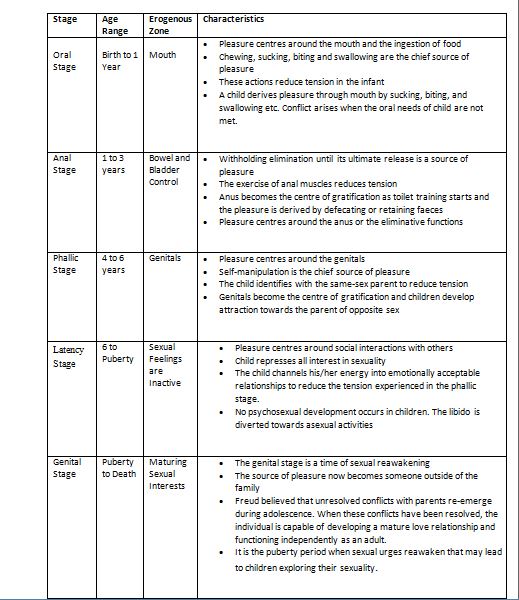Dr. V.K.Maheshwari, M.A(Socio, Phil) B.Se. M. Ed, Ph.D
Former Principal, K.L.D.A.V.(P.G) College, Roorkee, India
Freud’s theory of personality development focused on the effects of sexual pleasure that affects one’s psyche. Childhood sexuality plays an important role in the development of the personality (Freud, 1961a, pp. 141–149). According to him, every child is full of energy that needs to be channelized in the right direction. He named this energy as libido. He believed that libido provides the basic platform for the mind to run on. The infant is capable of receiving sexual gratification from rhythmic stimulation of any part of the body. The overall development of a child depends on the way he or she controls or directs this energy. Freud termed this polymorphous perversity. As the infant matures, the generalized ability to receive sexual gratification decreases as certain parts of the body become preferred sites for gratification. In other words, the possibilities for gratification of the sexual instinct narrow as the infant develops. Freud postulated a series of developmental stages that describe this narrowing process of sexual gratification Freud’s stages of development essentially showcase how sexuality starts from the very young age in humans and how it develops till adulthood at different stages. If these stages are not completed or psychologically satisfied, a person may get fixated there which may lead to conflicted personality in the adulthood.
Freud emphasized the role of sexuality in the development of personality. The narrowing manifestations of sexuality proceed through five psychosexual stages of development. As the person proceeds through these stages, propelled by inherent forces and moulded by the environment, he or she acquires various components of personality. Fixation at any of the first three stages may produce certain personality types, such as the oral, anal, or phallic character. Children with more resolved psychosexual developments have greater capacity to develop normal relationships with opposite sex.
Freud’s theory essentially revolves around libido hence his theory is known as psychosexual theory. Given below are Freud’s stages of development that are also known as Freud’s stages of psychosexual development:
Stage 1 – Oral Stage ( Age Range: Birth to 1 Year .Erogenous Zone: Mouth)

This stage occurs from birth to around one year. As the name suggests, in this stage, a child tries to gratify his libidinal energy through his mouth by sucking, biting, chewing, etc. All desires are oriented towards lips and mouth, which accepted food, milk, and anything else he could get hands on . The first object of this stage was, of course, the mother’s breast, which could be transferred to auto-erotic objects (thumb-sucking). The mother thus logically became first “love-object,” already a displacement from the earlier object of desire (the breast). Freud proposed that the mouth has five functions: (1) taking in, (2) holding on, (3) biting, (4) spitting out, and (5) closing. Each is a prototype for certain personality traits. As this stage occurs during the first year of life and develops from the act of feeding in which the mouth and lips naturally come to receive more stimulation than other parts of the body. Children putting everything in their mouth at this age, be it objects, toys, or chocolates. , Freud thought that the non-nutritive components of an infant’s oral behaviour were sexual. Conscious and unconscious memories of oral experiences have a central position in the psychological life of the infant, and new experiences are organized around these memories These functions take on symbolic meaning in the adaptations the individual makes in coping with the anxieties and stresses of life. Oral fixation has two possible outcomes. If the person is dissatisfied at this stage, he is characterized by pessimism, suspicion, and sarcasm and grows into an adult who reduces tension or anxiety through eating, drinking, and smoking etc. Such personality is known as oral receptive personality. On the other hand overindulged person is known as oral aggressive personality which is characterized by optimism, gullibility, and hostility etc.). For example, taking in through the mouth is the prototype for acquisitiveness, holding for tenacity, and spitting out for rejection. Whether these traits become part of one’s personality depends on the amount of anxiety and frustration experienced in the oral stage. For example, an infant who was weaned too soon or too abruptly may develop a strong tendency to be possessive in order to avoid repetition of the anxiety and frustration of the weaning experience (Fine, 1979, pp. 150–171; Hall, 1954). The primary conflict at this stage is the weaning process–the child must become less dependent upon caretakers. If fixation occurs at this stage, Freud believed the individual would have issues with dependency or aggression. Oral fixation can result in problems with drinking, eating, smoking or nail biting.
Stage 2 – Anal Stage:( Age Range: 1 to 3 years. Erogenous Zone: Bowel and Bladder Control)

The anal stage develops during the second and third years of life as the anal area begins to assume a central position in the child’s sexual development. As children become capable of voluntary muscle control and eventual bowel control, they discover that sexual stimulation occurs from voluntarily retaining and expelling faeces. Following the oral phase, the child enters the sadistic-anal phase, which is split between active and passive impulses: the impulse to mastery on the one hand, which can easily become cruelty; the impulse to scopophilia (love of gazing), on the other hand. This phase was roughly coterminous with a new auto-erotic object: the rectal orifice (hence, the term “sadistic-anal phase”). According to Freud, the child’s pleasure in defecation is connected to his or her pleasure in creating something of his or her own. Anal ideas and memories involve such activities as elimination, retention, smearing, or cleaning. Anal fixation may occur due to strictness showed by the parents while toilet training which has two outcomes. The first can be a person with oral retentive personality which is characterized by stinginess, excessive tidiness, perfectionism, and stubbornness. The other outcome can be anal expulsive personality, which is defined by lack of self control, carelessness, and messy behaviour. Freudian assumptions is that every child likes to play with his feces and urine, and that he derives sexual pleasure from retaining his feces when he should astride them; he is suppose to treasure his feces as a most valued possessions. This alleged sexual pleasure in the retaining, hoarding, and collection of feces is describe as anal-eroticism, and regarded as a component of the sexual instinct, one which gives rise to all that can be ascribed to a hording or acquisitive tendency. . Toilet training, which usually occurs during this time, can have the effect of establishing prototypes for later conflicts with authority figures, meticulous cleanliness and orderliness, or even generosity and philanthropy (Arlow, 1995, p. 25; Fine, 1979, pp. 177–188). According to Freud, success at this stage is dependent upon the way in which parents approach toilet training. Parents who utilize praise and rewards for using the toilet at the appropriate time encourage positive outcomes and help children feel capable and productive. Freud believed that positive experiences during this stage served as the basis for people to become competent, productive and creative adults.However, not all parents provide the support and encouragement that children need during this stage. Some parents’ instead punish, ridicule or shame a child for accidents. According to Freud, inappropriate parental responses can result in negative outcomes. If parents take an approach that is too lenient, Freud suggested that an anal-expulsive personality could develop in which the individual has a messy, wasteful or destructive personality. If parents are too strict or begin toilet training too early, Freud believed that an anal-retentive personality develops in which the individual is stringent, orderly, rigid and obsessive.
Stage 3 – Phallic Stage: ( Age Range: 4 to 6 Years. Erogenous Zone: Genitals)

This stage occurs between four to six years of age where the
 erogenous zones of the body are genitals start developing. At this age, children also begin to discover the differences between males and females.
erogenous zones of the body are genitals start developing. At this age, children also begin to discover the differences between males and females.
At this stage the child discovers the pleasures of genital manipulation and another shift of the zone of sexual stimulation occurs. In the phallic phase, when the penis (or the clitoris, which, according to Freud, stands for the penis in the young girl) become primary object. In this stage, the child becomes fascinated with urination, which is experienced as pleasurable, both in its expulsion and retention. At this stage they frequently indulge in playing with their genitals in order to explore them. Because of increased dexterity, the child can now have regular and intense pleasure by stimulating the genitals. Sensitivity now becomes concentrated in the genitals and masturbation (in both sexes) becomes a new source of pleasure. The child becomes aware of anatomical sex differences, which sets in motion the conflict between erotic attraction, resentment, rivalry, jealousy and fear which Freud called the Oedipus complex (in boys) and the Electra complex (in girls) This is resolved through the process of identification which involves the child adopting the characteristics of the same sex parent.
The most important aspect of the phallic stage is the Oedipus complex. This is one of Freud’s most controversial ideas and one that many people reject outright.(The name of the Oedipus complex derives from Greek myth where Oedipus, a young man, kills his father and marries his mother. Upon discovering this he pokes his eyes out and becomes blind.) This Oedipal is the generic (i.e. general) term for both Oedipus and Electra complexes. In the young boy, the Oedipus complex or more correctly conflict, arises because the boy develops sexual (pleasurable) desires for his mother. He wants to possess his mother exclusively and get rid of his father to enable him to do so. Hence the boy develops castration anxiety. A problem the little boy then sets out to resolve by imitating, copying and joining in masculine dad-type behaviours. This is called identification, means internally adopting the values, attitudes and behaviours of another person
For girls, the Oedipus or Electra complex is less than satisfactory. Briefly, the girl desires the father, but realizes that she does not have a penis. This leads to the development of penis envy and the wish to be a boy. On the Electra complex, Freud was more vague. The complex has its roots in the little girl’s discovery that she, along with her mother and all other women, lack the penis which her father and other men posses. Her love for her father then becomes both erotic and envious. The resolution of the Electra complex is far less clear-cut than the resolution of the Oedipus complex is in males; Freud stated that the resolution comes much later and is never truly complete. Just as the boy learned his sexual role by identifying with his father, so the girl learns her role by identifying with her mother in an attempt to posses her father vicariously. At the eventual resolution of the conflict, the girl passes into the latency period, though Freud implies that she always remains slightly fixated at the phallic stage.
Eventually, the child begins to identify with the same-sex parent as a means of vicariously possessing the other parent. To explain women, Freud argued that young girls followed more or less the same psycho-sexual development as boys. Indeed, he argues paradoxically that “the little girl is a little man” According to Freud, the young girl must also at some point give up her first object-choice (the mother and her breast) in order to take the father as her new proper object-choice. Her eventual move into heterosexual femininity, which culminates in giving birth, grows out of her earlier infantile desires.
Fixation at the phallic stage develops a phallic character, who is reckless, resolute, self-assured, and narcissistic–excessively vain and proud. The failure to resolve the conflict can also cause a person to be afraid or incapable of close love; Freud also postulated that fixation could be a root cause of homosexuality
Stage 4 – Latency Stage ( Age Range: 6 to Puberty. Erogenous Zone: Sexual Feelings Are Inactive)

Next followed a long “latency period” during which sexual development was more or less suspended and concentrated on repressing and sublimating of earlier desires and thus learned to follow the reality-principle. This stage occurs between six to twelve years when children express no psycho-sexual development. No further psycho-sexual development takes place during this stage (latent means hidden). The libido is dormant.
This stage is precursor to the fourth stage of psycho-sexual development, the latency period, which extends from age five or six to puberty. The resolution of the phallic stage leads to the latency period, which is not a psycho-sexual stage of development, but a period in which the sexual drive lies dormant. Freud saw latency as a period of unparalleled repression of sexual desires and erogenous impulses. At about age six, the sexual instinct diminishes and the child enters a stage of sexual quiescence. Freud thought that most sexual impulses are repressed during the latent stage and sexual energy can be sublimated (re: defence mechanism) towards school work, hobbies and friendships.
According to Freud, at this stage, children suppress their sexual energy and direct it towards asexual pursuits such as, school, athletics, hobbies, social relationships, friendship with same-sex, etc., During this phase, the child gradually freed himself from parents (moving away from the mother and reconciling with father) or by asserting the independence (if he responded to his incestuous desires by becoming overly subservient to his/her father). He also moved beyond his childhood egoism and sacrificed something of his own ego to others, thus learning how to love others
Stage 5 – Genital Stage: (Age Range: Puberty to Death .Erogenous Zone: Maturing Sexual Interests)

This stage occurs between twelve to eighteen years which is also the puberty period. This stage lasts from puberty to death or senility, whichever comes first. This fifth stage of psychosexual development is characterized by non-narcissistic behaviour that develops in the direction of biological reproduction. It is a time of adolescent sexual experimentation, the successful resolution of which is settling down in a loving one-to-one relationship with another in our 20′s or so. Sexual instinct is directed to heterosexual pleasure, rather than self pleasure during the phallic stage. In this stage, as the child’s energy once again focuses on his genitals, interest turns to heterosexual relationships. The less energy the child has left invested in unresolved psychosexual developments, the greater his capacity will be to develop normal relationships with the opposite sex. If, however, he remains fixated, particularly on the phallic stage, his development will be troubled as he struggles with further repression and defences. Characteristics of this stage are an attraction for the
opposite sex, socialization and group activities, marriage and the establishment
of a family, and vocational development. For Freud, the proper outlet of the sexual instinct in adults was through heterosexual intercourse. Fixation and conflict may prevent this with the consequence that sexual perversions may develop. Where in earlier stages the focus was solely on individual needs, interest in the welfare of others grows during this stage. If the other stages have been completed successfully, the individual should now be well-balanced, warm and caring. The goal of this stage is to establish a balance between the various life areas.
Evaluating Freud’s Psycho-sexual Stage Theory

Freud’s theory states that the person’s development is completed till he reaches adulthood and his sexual experiences dominate his behavior throughout his life. However, Freud’s stages of development were and are criticized by experts due to overemphasis of his theory on sexuality without any supportive corroborative data. The psychologists today believe that personality development is a continuous process that happens throughout life.
The theory is focused almost entirely on male development with little mention of female psychosexual development. Freud often had difficulty incorporating female desire into his theories, leading to his famous, unanswered question: “what does a woman want?” As Freud states late in life, “psychology too is unable to solve the riddle of femininity” . It is for this reason that many feminists have criticized Freud’s ideas and one reason why many feminists interested in psychoanalysis have turned instead to Kristeva.
For girls, however, Freud believed that penis envy was never fully resolved and that all women remain somewhat fixated on this stage. Psychologists such as Karen Horney disputed this theory, calling it both inaccurate and demeaning to women. Instead, Horney proposed that men experience feelings of inferiority because they cannot give birth to children.


